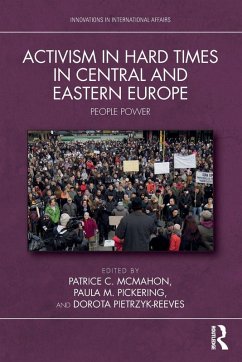Activism in Hard Times in Central and Eastern Europe elevates the voices of civic activists from Central and Eastern Europe (CEE) and analyzes a wealth of information to generate new insights into how activism in the region manages to be vibrant, diverse, and consequential.
Because of these countries' unique historical trajectory, CEE activists have, in important ways, leap-frogged their counterparts in the West. Giving special attention to activists in Bosnia and Herzegovina (BiH), Hungary, Poland, Russia, and Ukraine, the book focuses on responses to the recent "hard times" - the shrinking of public space for civil society, democratic backsliding, polarization, and Russia's war in Ukraine. The contributors contend that CEE activists provide important lessons for others confronting similar challenges around the world.
The book is well-suited for a variety of undergraduate and graduate courses, such as comparative politics, human rights, global governance, social movements, Central and East European politics, and contemporary world politics. This timely and readable book, co-created by academics and activists and written in a conversational tone, will also be of interest to the interested public and practitioners. The book encourages readers to think differently about the role of civil society and activism, as well as about how new tools and polarizing dynamics affect activism in this region.
Chapters 2, 3, 6 and 8 of this book are freely available as downloadable Open Access PDFs at http://www.taylorfrancis.com under a Creative Commons Attribution-Non Commercial-No Derivatives (CC-BY-NC-ND) 4.0 license.
Because of these countries' unique historical trajectory, CEE activists have, in important ways, leap-frogged their counterparts in the West. Giving special attention to activists in Bosnia and Herzegovina (BiH), Hungary, Poland, Russia, and Ukraine, the book focuses on responses to the recent "hard times" - the shrinking of public space for civil society, democratic backsliding, polarization, and Russia's war in Ukraine. The contributors contend that CEE activists provide important lessons for others confronting similar challenges around the world.
The book is well-suited for a variety of undergraduate and graduate courses, such as comparative politics, human rights, global governance, social movements, Central and East European politics, and contemporary world politics. This timely and readable book, co-created by academics and activists and written in a conversational tone, will also be of interest to the interested public and practitioners. The book encourages readers to think differently about the role of civil society and activism, as well as about how new tools and polarizing dynamics affect activism in this region.
Chapters 2, 3, 6 and 8 of this book are freely available as downloadable Open Access PDFs at http://www.taylorfrancis.com under a Creative Commons Attribution-Non Commercial-No Derivatives (CC-BY-NC-ND) 4.0 license.








